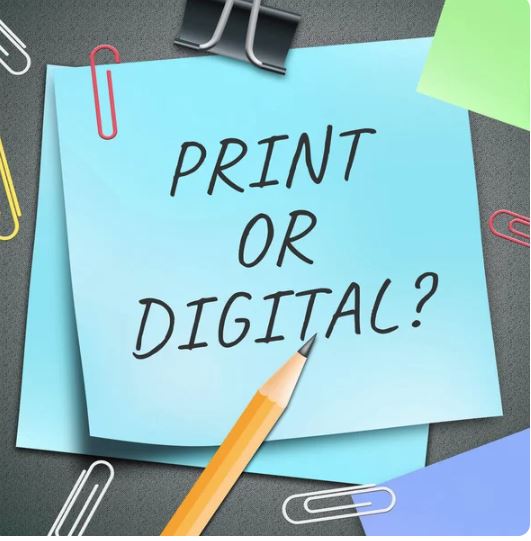Which is the best learning method? Computer or Paper
Journalism students researched and wrote the articles below. Read both articles and then vote here.
Computers and online work: Better for learning, better for the ecosystem
By: Jake Kershner, Shane Maleno, Evan Saxenmeyer
Every day people all around the world use paper to do things like schoolwork, write to people, and more. In today’s world, computers and electronics have taken over the work area for quite some time now, and many people prefer it over paper. Using computers allows easier access to documents, the ability to write more in a shorter amount of time, and is much faster and more efficient.
Many believe that physically writing out information allows a person to remember it better and is a more effective way of studying than typing. Paper is also healthier for us humans, as screens can cause weakened vision and headaches.
Even if paper is healthier for an individual, is it healthier for our environment? No, as it is estimated that 42 million trees are cut down each year to supply paper. A small headache from looking at a screen doesn’t sound so bad once you realize the paper industry is putting the entire world at risk by destroying ecosystems. Digital work also allows for easier studying of information. While physically writing a word allows a person to remember it better, a computer allows for the creation of complex and effective studying methods with flashcards, study guides, games, tutorials, etc. with much more ease and convenience than doing it physically.
One of the main appeals of digital use is convenience. Using a computer allows for easier storage and access of documents, and has less risk of losing said documents. Google Docs also allows for built-in citing and annotations, which is much easier than having to write out each individual annotation of paper.
On the topic of tedious writing, imagine having to write out a multi-page essay with a pen and paper. Online work also has the benefit of easier communication. Google Docs’ amazing annotation feature allows teachers to comment on your writing and point out specific sections of a piece, and email allows for easy communication between teacher and student.
Using a computer is more appealing than using paper due to the multitude of reasons previously stated. It is more efficient, productive, and convenient. I can understand wanting to value tradition by using pen and paper, but it is undeniable that doing work digitally is simply more effective.
Paper learning is more beneficial than online learning: It limits distractions and gives better test results
By: Emma Guinan, Lana Tropea, and Brendan Rowan
Throughout the school day, each teacher assigns work to their students, and they all have their personal preference on how to give out this work; on paper, or online. Many people have their preferences on that topic, but it should be known that the only way that should be preferred is to work on paper.
Some might say that it is easier to do work online because they can access it anywhere, and it can help them to complete work when they are not home or somewhere else where they can sit down and do their work. But, while this may seem amazing to students who need to easily access their work, they may not be sitting down and focusing on work they actually need to do. Students may think they can quickly type down their work and be done, but have they really focused and concentrated on the tasks?
Learning online isn’t all that great. Online learning creates more distractions. For example, students can go to other sites such as YouTube instead of doing work. Online learning also is a source of procrastination. According to the Los Angeles Times, “[In] a new study, 92% of college students would rather do their reading the old-fashioned way, with pages and not pixels.” The Los Angeles Times also reported that “The main reasons students preferred paper books, Baron told the New Republic, were the lack of distractions that are available on computers, as well as the headaches and eye strain that can result from staring at a screen” (“Why Do Students Prefer Online Learning?”).
It is proven that working on paper is “one of the most effective ways to study and retain information,” it also “prevents students from being distracted and keeps them focused on the task at hand” (“The Benefits of Paper vs. Digital Learning”). This further proves that when students can work on paper, they are more likely to focus on their work and retain the information, which in turn can higher their grades. A student from another district, also working on this topic, says, “When testing, many students perform better when they can work on paper” (Shaub and Ortega).
Another issue with online learning is that students are more likely to cheat on their assignments since they have online resources right in front of them. One student commented on this idea is, “While there is protection in place, such as GoGuardian, which is placed on school-issued laptops and allows teachers to monitor students’ computer activity, those platforms aren’t consistently used by all teachers, and students can avoid them by bringing their personal computers to the school. As a result, cheating can still occur”
Learning on paper allows students to be more interactive and limits possible distractions so that students get their work done quicker and more efficiently. If Students are encouraged to be on their screens fewer hours perhaps they will become better contributors to society.
Works Cited
“The Benefits of Paper vs. Digital Learning.” Paris Corporation, https://pariscorp.com/paper-learning-benefits/. Accessed 21 April 2023.
Schaub, Michael, and Orlando Ortega. “92% of college students prefer print books to e-books, study finds.” Los Angeles Times, 8 February 2016, https://www.latimes.com/books/jacketcopy/la-et-jc-92-percent-college-students-prefer-paper-over-pixels-20160208-story.html. Accessed 21 April 2023.
“Why Do Students Prefer Online Learning?” ASU Prep Digital, 5 April 2021, https://www.asuprepdigital.org/why-do-students-prefer-online-learning/. Accessed 21 April 2023.

